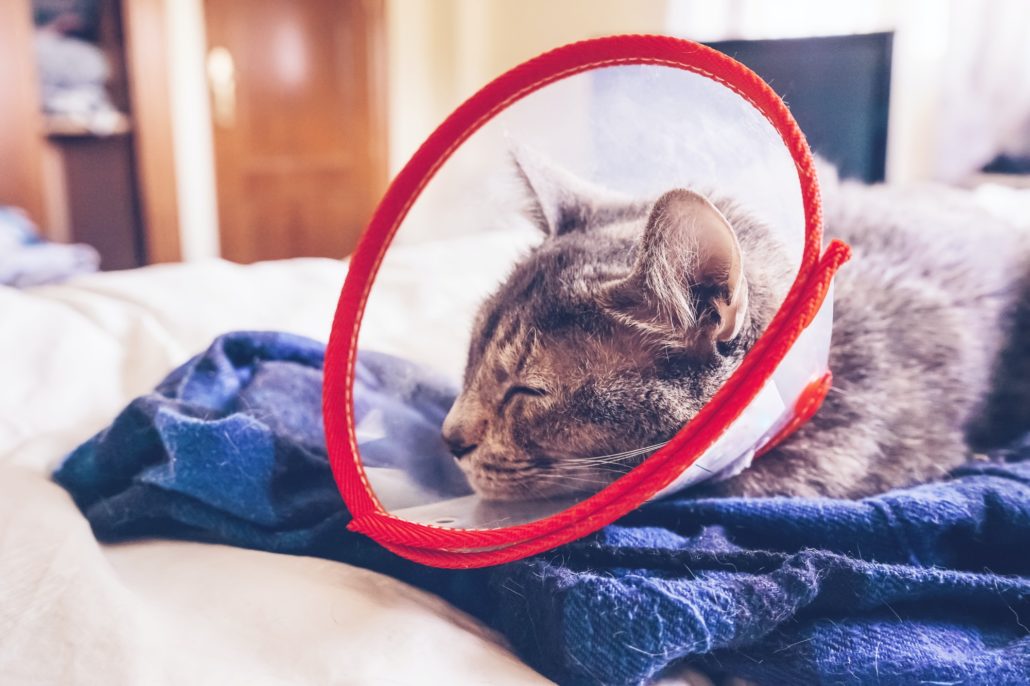3961 Hastings Street
Burnaby, BC V5C 2H8
604 291 6666
Client Support
Mon - Thu: 8AM - 6PM | Fri: 7AM - 5PM
Online store always open
Burnaby, BC V5C 2H8
Client Support
Online store always open

Neutering refers to the surgical procedure performed on male cats to render them infertile. Spaying refers to the surgical procedure performed on female cats in order to prevent accidental pregnancy by removal of ovaries and the uterus.
Cat spaying and neutering is best performed at 5-6 months of age.
Spaying involves surgical removal of both ovaries and the uterus. A qualified veterinarian must perform the surgery. A spay is a safe procedure. First, the pet is given a preoperative exam to ensure that she is healthy.
Your cat should not be fed for twelve hours prior to surgery. This prevents aspiration pneumonia from food in the stomach that may be vomited and pass into the breathing tubes and lungs.
The procedure is performed under full anaesthesia and conducted in sterile conditions. It can be performed under a number of anaesthetics and monitoring devices.
If you are shopping around for a competitive price on this procedure, be sure to question the type of anaesthetic used and the monitoring equipment and procedures followed.
We use several monitoring devices during your pet’s anaesthetic. Our monitoring devices and safety procedures allow us to respond to an anaesthetic emergency faster, even though anaesthetic emergencies are rare in healthy pets. Faster responses can save lives.
A spayed cat can be on her feet minutes after surgery and home the same day. Complete recovery takes from five to fourteen days.
During this time, exercise should be restricted and the incision must be kept clean. Any swelling, discharge, or infection should be reported immediately to the veterinarian.
Please call or visit our facility to learn more about our spaying procedures.
We recognize that minimizing your pet’s pain is of utmost importance. We know the issue of pain management is of great concern to pet owners.
The doctors at Hastings Veterinary Hospital make it a priority to stay abreast of the best pain management medications and strategies.
We have a variety of medications, in many formulations, available to manage your pet’s pain both before, during, and after surgery and in the event of trauma or illness.
We would be pleased to discuss the options available to you and your pet under any of the above circumstances.
Neutering refers to the surgical procedure performed on male cats to render them infertile. The neutering of a cat is best performed after 5 months of age or when the testes are fully developed.
Neutering involves surgical removal of both testicles. A qualified veterinarian must perform the surgery. A neuter is a safe procedure.
First, the pet is given a preoperative exam to ensure that he is healthy. He should not be fed for twelve hours prior to surgery. This prevents aspiration pneumonia from food in the stomach that may be vomited and pass into the breathing tubes and lungs.
The procedure is performed under full anaesthesia and in sterile conditions. It can be performed under a number of anaesthetics and monitoring devices.
If you are shopping around for a competitive price on this procedure, be sure to question the type of anaesthetic used and the monitoring equipment and procedures followed.
We use several monitoring devices during your pet’s anaesthetic. Our monitoring devices and safety procedures allow us to respond to an anaesthetic emergency faster, even though anaesthetic emergencies are rare in healthy pets. Faster responses can save lives.
A neutered cat can be on his feet minutes after surgery and home the same day. Complete recovery takes from five to fourteen days. During this time, exercise should be restricted and the incision must be kept clean.
Any swelling, discharge, or infection should be reported immediately to the veterinarian.
Please call or visit our facility to learn more about our neutering procedures.
Spaying or neutering my pet will cause obesity – False. Exercise and proper diet will keep your pet healthy and active.
My female pet needs to have a heat and litter to round out her personality – False. There is no proven benefit in allowing the animal to have a heat or a litter prior to spaying.
To learn more about our spaying and neutering procedures, visit our clinic, discuss your concerns, and set your mind at rest:
Unit 102 at 3961 Hastings Street, Burnaby, BC, V5C 2H8; or phone: 604‐291‐6666.
From kitten to senior care, explore all the other cat-related pages that we created for you!
Sign up for our newsletter to receive the best tips, articles and other resources for your pet’s health.
08:00 AM - 6:00 PM
08:00 AM - 6:00 PM
08:00 AM - 6:00 PM
08:00 AM - 6:00 PM
07:00 AM - 5:00 PM
We are closed